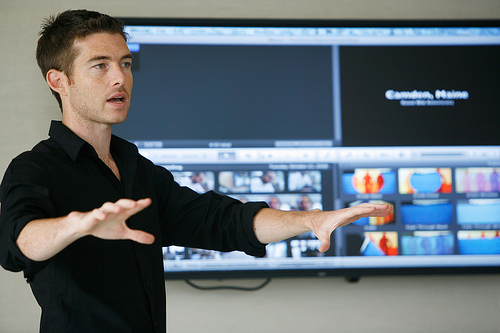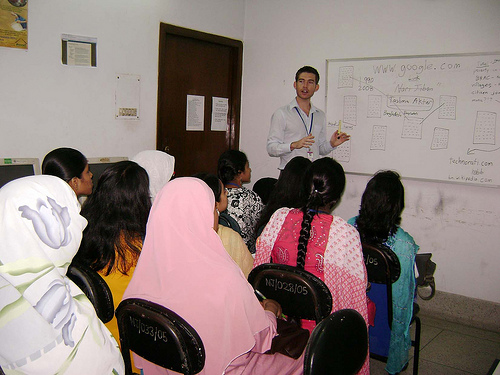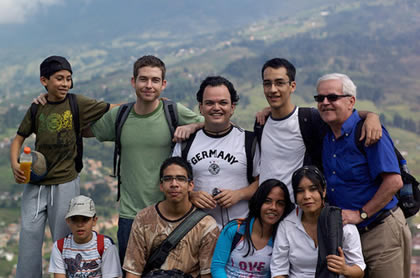Rising Voices note: This post by David Sasaki, Rising Voices’ first Director is part of the month-long feature commemorating RV's 5th Anniversary.
In 2004 two important online communities began at Harvard University: Global Voices and Thefacebook (*). From the outset Facebook's ambitions seemed modest; it aimed to allow Harvard students to add their own basic information and photos to a campus directory. Global Voices’ ambitions, on the other hand, seemed grandiose; as foreign news bureaus were closing, a small community of mostly volunteers aimed to curate and contextualize all the world's blogs to bring about the first truly global conversation.

David Sasaki speaking on Digital storytelling in 2008 Pop!tech. Image from Flickr by Kris Krüg/Pop!tech. CC BY.
By 2006 both Facebook and Global Voices understood that they would need to expand to achieve their greater potential. Facebook, after already expanding to other universities around North America, decided to open up registration to high school students. Later in the year they would open up the platform to anyone with a valid email address. Meanwhile, at Global Voices we began to observe that the vast majority of bloggers featured on the website — though they represented nearly every country in the world — tended to live in the wealthiest neighborhoods of the largest cities. Global Voices was, at the time, a reflection of the world through the eyes of its elite — highly educated, upper-class, and with plenty of time on our hands.
Exactly five years ago, Rising Voices (“helping the global population join the global conversation”) set out to counter this imbalance with as few resources as possible: 1) symbolic grants of up to $5,000, 2) multi-lingual guides that clearly explain how to produce digital media, and 3) a mentorship network for online veterans to lend a helping hand to newcomers.
Five years later it is remarkable to look back and see how much has been achieved with so little. In Thessaloniki, Greece, blind bloggers use new technologies for the visually impaired to share their experiences, including policies related to accessibility. A group of Palestinian women based in Nablus are using blogs and digital video to record personal and family stories about the origins and the traditions of local cuisine. Those blog posts have helped attract foreign visitors to take cooking classes at the women's center, and to learn about Palestinian culture beyond the usual treatment of violence and victimhood that we see in the daily press. Mongolian citizen journalists have called greater attention to the many environmental threats facing their country. Some of the content has even translated into German so that German residents are aware of the questionable behavior of their nation's mining companies operating abroad. Library users in the Colombian village of San Javier La Loma rewrote and remixed their community's violent history by creating new media that focused on local culture and local personalities. This is just a small sample of the dozens of projects that have been supported by Rising Voices over the past five years.

David Sasaki in a Training Workshop for Narijibon bloggers in Dhaka, Bangladesh. Image from Flickr courtesy Narijibon
Attention and conversation
It is expected that Facebook will reach one billion users this year, about one of every seven people on the planet. More than 250 million photos are uploaded to Facebook every day. And, as of this week, the company is valued at over $100 billion. Rising Voices, on the other hand, has helped train a few hundred bloggers based in a few dozen communities. It hasn't made any money selling advertising or user information. Its budget is just a few hundred thousand dollars a year.
By just about any measurement, Facebook has been wildly more successful than Rising Voices. But that is because we increasingly measure success by the economics of attention. At Quora a former Facebook employee published a fascinating explanation of Facebook's strategy to reach 500 million users. Facebook meticulously measures every action of every user to make sure that he and she will spend as much time on the website as possible, and thus view as many advertisements as possible. (10.5 billion minutes are spent on Facebook daily, excluding mobile.)
One way we can treat attention is, like Silicon Valley, as a commodity; each minute of our attention has a monetary value assigned to it. Another way to treat attention is as conversation.
Two books have greatly influenced my thinking this year about the power of conversation to give greater meaning to our lives. The first is Together: The Rituals, Pleasures and Politics of Co-Operation by Richard Sennett. The second is Theodore Zeldin's Conversation: How Talk Can Change Our Lives. Both books acknowledge that it is easiest to use our attention passively, gossiping or mindlessly clicking through photo after photo of celebrities and close friends.
It is far more difficult — though potentially far more rewarding — to engage in deep conversation with individuals unlike ourselves, to narrow the gap between us by learning to see the world through each other's eyes. The value of conversation isn't measured in clicks and time spent on a website, but rather in terms of mutual enlightenment and satisfaction. This is the immeasurable good that I believe Rising Voices has consistently achieved in just five short years, and with few resources.
I can't help but wonder what the world would be like today if 10.5 billion minutes per day were spent on Rising Voices and Global Voices instead of Facebook. Would we be less jealous and more empathetic? Would we be more concerned with including others than constantly feeling excluded ourselves? Would we spend more time learning about others and less time managing our own online reputations?

David Sasaki with Convergentes Bloggers in Colombia. Image by David Sasaki from Flickr. CC: BY-NC-SA
On a personal note
In 2010 I stepped down from directing Rising Voices and left the initiative in the much more capable hands of Eddie Ávila. No, Eddie is not as well known as Mark Zuckerberg, but he and Rezwan have gone on to grow Rising Voices into something larger, better, and more influential than I had ever expected. (This year Rising Voices received more than 1178 applications from more than 122 countries.)
By the end of my time at Rising Voices I had felt that I had spread my attention too thin. I felt almost at home everywhere I went, and yet never had a community to call my own. I had countless inspiring conversations from Uganda to Uruguay to Ukraine, but very few people I could call when I needed to talk. More recently I have become something of a homebody, spending much of my attention (and my conversations) on my city and my neighborhood.
Rising Voices taught me two important lessons that will forever stay with me. I have learned that there are indeed limits to global citizenship. Trying to cultivate a sense of belonging everywhere comes at the cost of not truly belonging anywhere. Second, in the words of Richard Sennett, I learned to treat cooperation as a craft, as a skill that is developed and refined throughout life.
![rising voices meeting [640x480]](https://rising.globalvoicesonline.org/files/2012/06/rising-voices-meeting-640x480.jpg)
Discussion at Berkman Center For Internet & Security on Rising Voices. Image by Jillian C. York. CC BY-NC-ND
Zadie Smith once asked her readers to do the following:
Step back from your Facebook Wall for a moment: Doesn’t it, suddenly, look a little ridiculous? Your life in this format?
In terms of users and attention, Rising Voices will never be able to compete with Facebook, or whatever new social network that might follow. But what is important is that Rising Voices exists at all, an alternative to break free of the gimmicky games and predictable photos of drunken friends. The world is so much more than the thin slice of what floats across our screens.
Thumbnail image from Flickr by Catherine Bracy. CC: BY-NC-SA.




4 comments
Never thought I would see Rising Voices compared to Facebook! Thanks for sharing this lovely post David. All your work getting Rising Voices off the ground was something really special and admirable. I think we’ve all learned many unexpected lessons from the Rising Voices community.
I consider Facebook more of an entertainment social media while Rising Voices as an informative and educative social media on issues that seem to touch all ages. Here in Malawi, the age group of mine are not that much interested in Facebook. I guess Facebook and Rising Voices had different goals when establishing them and comparison of the twoo is not fair. As you say if both Facebook and Rising Voices wants to cultivate a culture of capturing everybody’s interest, they will both end up of caprutring nobody that belong to them.